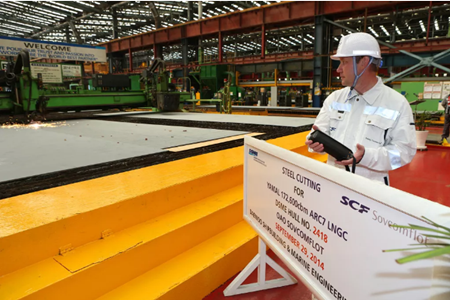|
Shpboard prices rise, south Korean shipping companies to play the "China brand"

Since December, the Korean shipbuilding and steel industries have been in a dispute over the price of thick plates for ships for five months, reported Kinews. The steel industry, citing the rise in raw material prices and the normalization of prices, expressed the position to continue to increase the price of thick plate for ships. In response, the shipbuilding industry, citing the ship market has not fully recovered, "looks difficult". Although this price negotiation war has been over 5 months, there is no sign of narrowing the gap between the two sides. However, time is running out. The price negotiation between Korean shipbuilding industry and steel industry will enter the specific negotiation stage in April before the arrival of the price negotiation in the second half of this year.
Steel firms insist on higher prices: shipbuilders' cry foul '
As the main raw material of ship construction, thick plate accounts for 10% ~ 20% of ship construction cost. In the past five and a half years, South Korea's steel industry has raised slab prices on the grounds that "the shipbuilding industry is recovering and it is time to raise prices". Indeed, expectations for a change in plate prices are rising in the steel industry following the revelation last year that south Korean shipbuilders were taking on a barrage of new orders. A steel industry source said that during the shipbuilding boom from 2000 to 2010, plate prices rose by won1m a tonne, but as the industry sank into recession, plate prices began to fall until steelmakers "could afford it". He added: "although the price of thick plate has increased continuously in the past five half-year price negotiation period, the price of thick plate is still at a relatively low level considering the price of raw materials and other factors. The current price increase plan of thick plate is decided according to the situation of shipbuilding industry." Korean plate prices have risen by about 300,000 won a tonne in the past two and a half years, with the steel industry aiming for an eventual increase of 700,000 won a tonne.
South Korea's shipbuilding industry has been vocal about the rising price of slabs. On March 7, the Korea shipbuilding and Marine engineering association issued a statement saying the price increase was too heavy for the recovering shipbuilding industry. "At present, the recovery of the shipbuilding industry has not really arrived, and the continuous rise in Korean plate prices is imposing a huge burden on the shipbuilding industry," the association said. To be specific, although the new ship orders of Korean shipping companies have been increasing gradually in the past two years, they are still below the average level in terms of the average order quantity in the past six years. The association further stressed that in 2019, the three major shipbuilding enterprises in South Korea are expected to demand 5.1 million tons of thick plate. If the price increases by 50,000 won per ton, it will bear the cost burden of 255 billion won, and the increase in thick plate price will "make the survival of the Korean shipbuilding industry critical" when the ship price has not returned to the normal level.
Shipping companies' haggling 'with Chinese steel mills
At present, the price negotiation between Korean shipbuilding industry and steel industry is not smooth. It is said that Korean shipbuilding industry plans to replace its domestic thick plate products with foreign thick plate products.
Recently, Chinese shipbuilders have been recovering their competitiveness due to falling domestic plate prices, south Korean media reported. "The steel industry's insistence on raising plate prices will throw cold water on the domestic shipbuilding industry," the shipbuilding industry said. But a south Korean steel industry source said: "Chinese slabs are not as cheap as we usually think, and they are small in size compared with domestic slabs, so it is not easy for shipowners to use. In order to gain an advantage in the thick plate price negotiation, Korean shipping companies are planning to use the introduction of Chinese thick plate 'card'.
Generally speaking, the thick plate price negotiation in South Korea is conducted freely among enterprises, and the second negotiation is conducted every six months, which has formed the pattern of daily routine meeting and coordination. Steel mills will continue to supply their shipbuilders with slabs even as price negotiations continue. Moreover, if the price negotiation between different enterprises ends afterwards, the price of the thick plate supplied before the negotiation will "make up the price difference".
South Korean steel industry relevant personage says, thick plate price negotiation every time delay has become a "norm", ongoing individual negotiation between different enterprises, because of the commercial secrets of the "sensitive" involved, so the price or consultation process will not be open, may cause the price to negotiate "misunderstanding" lack of progress. Shipbuilding industry insiders say that if the price negotiation ends, the price of the plate supplied before will "make up the difference", so in fact the negotiation date is not important, and there will be delays every time. It is reported, at present Korea shipbuilding industry and steel industry are engaged in intense private negotiations on the price of thick plate.
In response to speculation in April whether the shipbuilding industry and the steel industry will come up with a negotiation program, an industry related personage said: "because in the thick plate price next six months on the eve of the negotiations, from the previous two sides of the negotiation process, generally within six months there will be a result. The two sides will soon face the thick plate price next six months of negotiation period, within this month to have the exact news, the possibility of success will be high.
|










